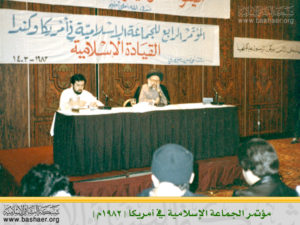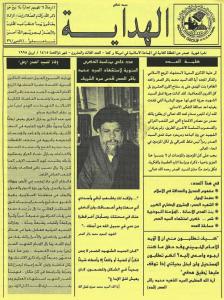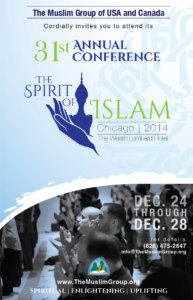Shīʿī Institutions of North America: The Muslim Group – An Interview with Dr. Ghassan Zalzaleh
The Shīʿī community in North America, from its earliest years, founded a number of organizations to provide institutional support for the community’s array of needs and goals. Many of the earliest founded institutions continue to exist today, though in an evolved form. This is the second in an installment of Occasional Papers that explore the roots and developments of some of the community’s important institutions and projects through the eyes of the some of their prominent participants. In this interview, we continue the series with the Muslim Group (also known as the Muslim Group of the United States and Canada).
Al-Sidrah had the privilege to speak with Dr. Ghassan Zalzaleh. Dr. Ghassan Zalzaleh is a Syrian-American oncology doctor who lives in the suburbs of Chicago. He is the head of the Board of Trustees of the Muslim Group and has been working, hand-in-hand, with other board members for more than 25 years to keep this organization contributing to the Muslim community of North America.
° ° °
Transcript (lightly edited for clarity and content)
Q: What can you tell me about the Muslim Group? And what is your position at Muslim Group?
A: Muslim Group it is a non-profit organization that was established about 35 years ago for Muslims who live in America. It was established at that time because there was a need for a gathering for the Muslim students coming from different countries and for those who were living in the US. It was founded by students for students with the blessings and following the advice of religious leadership (marājiʿ). The Muslim Group has a Board of Trustees and I am one of these five board members.
Q: How broad and how active was the Muslim Group when it first started?
A: Muslim Group was established only to serve the Arab Muslim community in America, mainly students and their families who came to study here. It started as an occasional gathering to accommodate religious needs as Muslims in America.
Q: So for the past 2 or 3 conferences, I noticed that it primarily depends on young adults and on students. Has that always been the case or was there some sort of senior supervision?
A: Well actually those people who started the organization at that time, they were young and they had to do all the work themselves. There were no senior members or other senior ʿulamaʾ supervising their work directly, until they became seniors later on. Their children or those who were children and young kids at that time became the young staff and workers of that organization.
Q: What made you decide that establishing such an organization was important in the United States?
A: At that time, 30-40 years ago, we lacked Islamic centers, mosques, Islamic libraries, social clubs, and other Islamic facilities. There were only a few such institutes, here and there, and they were not accessible to everyone. Furthermore, communication between Muslims at that time was hard due to the scarcity of Islamic centers, and therefore, it was a necessity, at that time, to do some networking, to socialize, to arrange some gatherings, and to bring Muslims together, to provide some social and Islamic education to people, and for our younger generations to grow up with other Muslim peers. That is what made it a highly demanded necessity in the community.

Q: Was there a scholar or a religious institution that sponsored or supervised the group in its first days?
A: No, there was no sponsorship in that sense; however, it was advised by the marjiʿ Sayyid Muḥammad Ḥusayn Faḍl Allāh in the 1970s. I believe he had come here to the US and saw the conditions of Muslims living here and got in touch with them; so he advised the youth at that time to make this and go from there. He was giving us his blessings all the time as well as other marājiʿ later on, but that does not mean it was sponsored by anybody.
Q: For the past 35 years, how has the Muslim Group gathered their funds, and how are they able to give scholarships and other benefits to the community?
A: Usually we have our annual conference which covers its own fees and expenses, and also we have donors. Al-ḥamdu lillāh, for the past 30 years, every year we have some believers who can support this group financially, and they prefer to be anonymous to get more ajr (reward). These are the two major sources for our funding.
Q: Is there anything besides the conference that the Muslim Group provides to the community?
A: Not that much! I mean, as I told you before, when MG first started, there were no Islamic centers or other facilities to serve the Muslim community. There was a greater need for centers and many other things, and therefore we tried to fill the gap. We did youth camps almost every year. We held Duʿāʾ al-Kumayl every week, had a library, and had a magazine called “al-Hidayah.” All this was in the 70’s, 80’s, and early 90’s. Later on, the need from us to do all this was less. Al-ḥamdu lillāh other centers opened their doors and they were offering these services. However, there was more need for communication and networking for Muslims among themselves. Our group focused more on this side, as well as education, and hence we still have our annual conference and the library.

Q: Based on that, we can understand that now there is no main office, headquarter, branches. Is that correct?
A: We still have branches in different cities, but they are no longer active. The library is still in Dearborn, MI. Our headquarters is in Dearborn at the library. Most of the old staff and our senior members who were there left and went back to their home countries. That is the main reason why MG was fading away, but māshāʾAllāh we have a new generation that is coming right now. And, you see, MG started with only Arab Muslim students; now, after 35 years, we matured to include other Muslims from different ethnic backgrounds. In the beginning, Arabic was the main language. Now, we have matured for English to be the main language. It is a long maturing process, and al-ḥamdu lillāh we are growing and maturing in the right direction.
Q: On your website, it says that you have a Board of Trustees, Executive Board, and then there are the Regional Committees. So my understanding is that the Board of Trustees controls the administrative part; and the Executive Board, which is mostly young people, is responsible for executing orders. Is that right? And what more can you tell us about it?
A: No, that is not correct! We have a Board of Trustees, which is comprised of five members whose role is to maintain the integrity of the Muslim Group’s path of Islamic activism. And for any critical decision, we need to be involved. And any time the Executive Committee has any conflict or any doubt about any issue, they consult the Board of Trustees. The Board of Trustees has the superior power, has the educational and supervision power, but we do not order people. We do not order. We tell them about the conference, ideas, and thoughts. We lay everything in front of them and we ask them to come up with a plan to make this happen. They take all that and come back with a plan and here our job is to give them some advice, but we do not oblige them to take it, unless there is a greater good and it is really critical.
Q: In the past three years, the conference has been held here in the Chicagoland area. Is this going to continue? Can we say that Chicago is the new headquarters?
A: No, it is not the new headquarters. Our decision was based on numerous reasons. The most popular and the easiest to reach city was Chicago. It is mainly because of the ease of coming here: to and from the airport, close to Milwaukee, Indiana, Michigan, St. Louis, and other cities. That was number one. Number two is that you cannot make it on the east or on the west costs. The other cities that can compete with Chicago is Saint Louis, which we have tried a couple of times. The conference was not as successful as when it was in Chicago. Moreover, the community of Chicago is also helping and wanting this to be here, which is good. The hotels here are better, because you need a hotel that can accommodate 1000 attendees; and you would want to have plan B, just in case there is some problem. Chicago is big enough to offer this too, and cover it.

Q: Does the Muslim Group plan to co-work with other organizations, centers, schools, or seminaries?
A: The Muslim Group, for the longest time, they have been open to work with anybody if they share the same mission with them. Now, there is an idea that is being studied and might be executed this year which is to have the Ahl al-Bayt Islamic Seminary organize a couple of sessions at the conference, and that will show collaboration.
We have tried this with other organizations, some worked okay while others did not work. This is the reason why we are very careful with this thing. We, almost over the last 30 years or so, kept our neutrality. We kept being open to every Muslim, even if they are not from the Shīʿī school of thought. We brought speakers from different schools of thought and from different backgrounds. We try to deal will all the issues that face Muslims in the US, so our speakers do not speak only about Islam, but also medicine, science, technology, etc. We are not restricting ourselves to anything. We are open for any discussion about any collaboration with anybody who shares our mission, and our mission is to improve the well-being of the Muslim community in North America by educating, socializing, and by networking together.
Q: Do you have any closing remarks on behalf of the Muslim Group to the Muslim community at large, or to the Ahl al-Bayt Islamic Seminary faculty and students, specifically?
A: To the community at large, we are always appreciative of them. They never, ever let us down. They never failed us. Every year we hold the conference, it is better than the year before. And I know that the new generation and the youth are showing much enthusiasm and also professionalism, which is giving us more confidence and forcing us to give more and more to the community back.
For the ḥawzah: this year, we had a collaboration in one or two sessions in the night programs, and it was a good start. We understand that this is a new theme or environment for them, and we thought at the same time that this may, at one point, present to them an opportunity to practice their studies that they are doing at the ḥawzah, and for them to try to help others through this conference. This conference is going to make them interact with many people, not only from Chicago, rather from different cities of the USA and Canada. So there is a mutual benefit inshāʾ Allāh. And inshāʾ Allāh we will have some kind of fruitful collaboration in the near future.